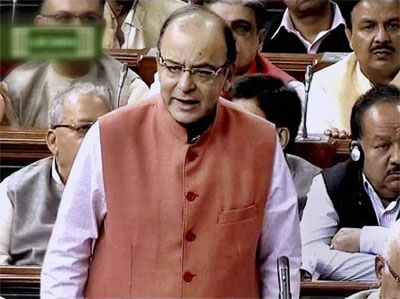In his Budget for 2016-17, Jaitley had proposed to tax 60 per cent of the corpus of the EPF contributions created after April 1, 2016 at the time of withdrawal.
 In the face of all round attack, Finance Minister Arun Jaitley on Tuesday completely rolled back the controversial proposal to tax the employees' provident fund at the time of withdrawal.
In the face of all round attack, Finance Minister Arun Jaitley on Tuesday completely rolled back the controversial proposal to tax the employees' provident fund at the time of withdrawal.
Taking the first opportunity available, he made a suo motu statement in the Lok Sabha in which he also announced withdrawal of imposing monetary limit for contribution of employers to provident and superannuation fund of Rs 150,000 for taking tax benefit.
Jaitley, however, left untouched the proposal tax exempt 40 per cent of National Pension Scheme and services provided by Employees’ Provident Fund Organisation to employees.
"In view of the representations received, the government would like to do comprehensive review of this proposal and, therefore, I withdraw the proposals in para 138 and 139 on my budget speech.
“The proposal of 40 per cent exemption given to NPS subscribers at the time of withdrawal remains," the minister said.
The minister had earlier indicated that he would address the concerns on retirement tax when he replies to the debate on Budget 2016-17 in Parliament.
In his Budget for 2016-17, Jaitley had proposed to tax 60 per cent of the corpus of the EPF contributions created after April 1, 2016 at the time of withdrawal.
He proposed to exempt these from Income Tax if the amount was invested in pension annuity scheme.
The proposal came under immediate fire from both employee unions and political parties who said the government was taxing employee when they need the funds most.
The government justified the move saying the attempt was to create a pensioned society and encourage employees to invest their savings in annuities.
A day after the Budget, it had indicated in a statement that it could consider imposing the tax only on the interest part of the corpus.
But Tuesday's decision withdraws the proposal lock-stock-and-barrel.
In his statement, Jaitley said a number of representations had been received from various sections of the society, including members of Parliament, suggesting that this change would force people to invest in annuity product even if they are not willing to do so.
"The main argument is that the employee should have choice of desire where to invest.
“Theoretically, such freedom is desirable but it is important for the government to achieve policy objectives by the instrumentality of taxation.
"In the present reform the policy objective is not to get more revenue but to encourage the people to join the pension scheme.
“There are various suggestions received, which can also achieve the same policy objective of encouraging people to join the pension scheme," he said in the statement.
Jaitley said the purpose of the Budget proposal was to encourage more private sector employees to opt for pension security after retirement instead of withdrawing the entire money from the provident fund account.
To achieve the objective, the minister said, "the government has announced that 40 per cent of the total corpus withdrawn at the time of retirement will be tax exempt both under recognized provident fund and NPAs".
The proposal, he added, was aimed at encouraging employees of private companies to place 60 per cent of the corpus in annuity so that they could get regular pension.
"When this 60 per cent of the remaining corpus is invested in annuity, no tax is chargeable.
"This means that the entire corpus will be tax free if invested in annuity. Only the periodic return on annuity will be taxable," he said, adding that the idea behind the mechanism was to encourage people to invest in pension products rather than withdraw and consume the entire corpus after retirement.
He further said the main category of people for whom EPF scheme was created are members of the EPFO who are within the statutory wage limit of Rs 15,000 per month.
"Out of around 3.7 crore (37 million) contributing members of EPFO as on today, around 3.26 crore (32.6 million) subscribers are in this category.
For this category of people, there is not going to be any change in the new dispensation," Jaitley said.
However, he added, in EPFO there are other contributing members who have accepted EPF voluntarily and are an employees of private of public sector companies.
"At present, even this category of people can withdraw the whole amount without any tax liability.
"In the proposed amendment, there will be no tax liability on such employee at the time of retirement if he contributes 60 per cent in annuity products so that pension security can be created for him according to his earning capacity.
"However if he chooses not to put any amount in annuity product the exemption will be limited to 40 per cent," he added.
The government will now review the Budgetary proposal in view of the representations received.
Finance Minister Arun Jaitley. Photograph: PTI










